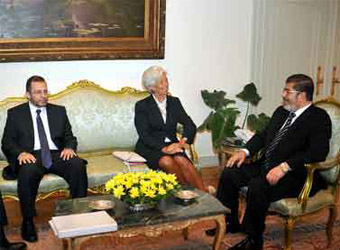Egypt’s negotiations for a $4.8 billion loan from the IMF have been delayed to give the government more time to draw up its economic reform programme, the two sides said on Monday.
Egypt was due to receive a team from the International Monetary Fund at the end of September to discuss the terms of the loan. It urgently needs financial support to prop up state coffers weakened by economic turmoil since the popular uprising last year that ousted President Hosni Mubarak.
“The authorities are working on their economic programme and have indicated that they need some additional time to advance their preparations and be ready to receive a mission,” IMF spokeswoman Wafa Amr said in emailed statement on Monday.
“We are ready to send a technical team to Cairo to discuss possible financial support for a homegrown programme as soon as this process is completed.”
Al-Borsa financial daily quoted Egyptian Finance Minister Momtaz al-Said on Monday as saying the government needed to complete the economic programme before the loan talks to demonstrate to the IMF that it is serious.
The programme’s two main axes are a restructuring of subsidies and taxes, he said. The government is working diligently on studies of these and the reform programme should be finished soon, Saeed added.
Optimism that a new, Islamist-led administration was moving fast to secure the long-delayed loan and avoid a fiscal crunch has sent the country’s stock market soaring in recent months, and yields on government debt have tumbled.
Economists and stock market traders said they were concerned the postponement meant Egypt’s fiscal crisis could drag on for months. The benchmark share index tumbled 3 percent on Monday partly on news of the delayed visit.
“I think delaying it creates more uncertainty, and uncertainty is bad,” said David Cowan, an economist with Citi.
The IMF is demanding Egypt put a programme in place that will narrow a budget deficit that has mushroomed to 11 percent of gross domestic product since the uprising ousted Mubarak in February 2011.
REFORM PROGRAMME
President Mohamed Morsi’s government says it wants to limit energy subsidies, which eat up about a quarter of all state spending, by targeting them more towards those who need them most.
Yet the government, facing parliamentary elections sometime in the coming months, is anxious about pushing through austerity measures that could trigger voter anger, analysts say.
Prime Minister Hisham Kandil said last month that the government planned to introduce a coupon or smart card system in October to ensure that the poor, rather than everyone, got subsidized butane cooking gas.
The government sells canisters of butane for 5 Egyptian pounds each, while their actual production cost is more than 65 pounds.
Kandil said the government would tackle other subsidized petroleum products such as petrol and diesel within the coming months.
Al-Borsa quoted Saeed as saying the IMF team would not return until well after the IMF’s annual meeting in Tokyo. That meeting takes place on October 9-14.
The government is also lobbying hard to kick-start inward investment that has stagnated since the uprising.
The finance minister was not immediately available for comment.
Source: Reuters
